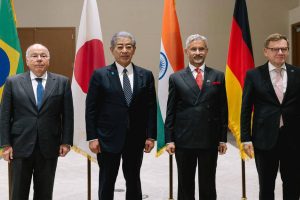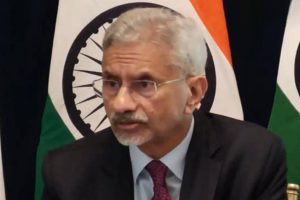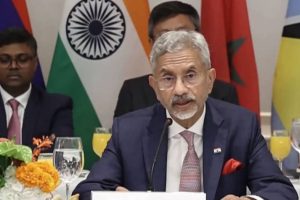External Affairs Minister S. Jaishankar delivered opening remarks at the 14th India-France CEO Forum on Tuesday (local time), emphasizing the vital role of trust, transparency, and collaboration in the digital era, particularly in the domains of AI, software development, and cybersecurity. He also highlighted the significance of the 2026 India-France Year of Innovation and urged both nations to use this opportunity to drive progress.
Jaishankar stressed that the development of AI with minimal bias can only be ensured in a multipolar world, reinforcing his earlier calls for a balanced global landscape where nations collaborate to tackle shared challenges. He said, “We are meeting on the sidelines of the AI Action Summit. The digital era demands trust and transparency—qualities we both share. This summit is a reminder of how much more we can achieve in AI, software development, and cybersecurity. The 2026 India-France Year of Innovation is a chance for us to shape global discourse. Only a multipolar world can ensure that AI is developed with the least bias.”
Jaishankar further highlighted the strong bond between India and France, two nations known for their tradition of independent thinking. This shared mindset has enabled them to form a strategic partnership that strengthens their positions on the global stage. “We are two nations with a history of independent thinking. This has manifested in various ways—whether as the third way, strategic autonomy, or a multipolar world. Beyond sharing similar views, we actively work to strengthen each other’s positions and make our collaboration a key factor in global affairs,” he said.
The External Affairs Minister emphasized that the success of this partnership lies in translating it into tangible business outcomes. He noted that the growing relationship between India and France is no longer limited to simple buyer-seller transactions but is evolving into deeper collaboration, including co-designing and co-production. He added, “Partnerships have real meaning only when they get translated on the ground, and that responsibility lies largely with business. As our relationship matures, the role of business is expanding. We are moving beyond the buyer-seller phase into greater collaboration, including co-production. The ‘Make in India’ initiative opens new possibilities, and the current level of trade and cooperation is far below what it could and should be.”
Jaishankar also stressed the urgency of de-risking the global economy, emphasizing that India and France are poised to make a significant impact. “We need more diversified production, resilient supply chains, and deeper business collaborations. India and France can lead the way and motivate the rest of the EU. Business, I would say, should weigh in on our FTA negotiations,” he said.
In the realm of defense and aerospace, Jaishankar pointed out that both countries already excel, with their collaboration poised for further growth. “Defense manufacturing and aerospace are well-established areas of our cooperation. The nature and scale of this collaboration are set for a major leap. The challenge before us is whether we can capitalize on this potential,” he stated.
The clean energy transition also emerged as a key area for cooperation, particularly in nuclear and renewable energy. Jaishankar identified green hydrogen and green ammonia as crucial components for future collaboration. “The clean energy transition is underway in India and worldwide, and green hydrogen and green ammonia are important subjects for our collaboration,” he added.
Another major area for collaboration is infrastructure development, with India undergoing rapid transformations in railways, airports, highways, and ports. The IMEC (India, Middle East, Europe Economic Corridor) project, in particular, has the potential to be a game-changer. Jaishankar noted, “Infrastructure is changing rapidly in India. We are seeking technology, best practices, and resources. The IMEC project can be a game-changer, and there has been progress on its eastern end despite some complications.”
Jaishankar also observed that India’s growing economy, along with rising incomes and changing lifestyles, is creating new opportunities for businesses to meet emerging needs. “As incomes rise, lifestyles change, which will drive new demands across many sectors. India’s landscape today is much more conducive to doing business, with improvements in ease of living, infrastructure, and governance,” he said.
The stage is set for India and France to forge an even stronger partnership, driving growth, innovation, and de-risking the global economy. Jaishankar’s call to action at the AI Action Summit underscores the vast potential for collaboration in AI, software development, and cybersecurity as the two countries look ahead to the 2026 Year of Innovation.





